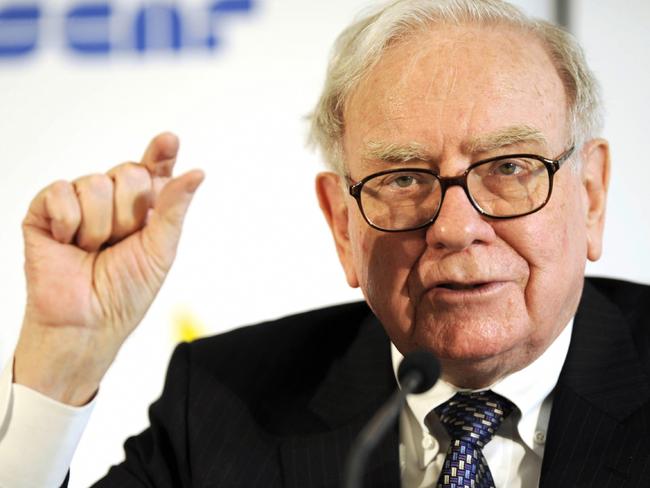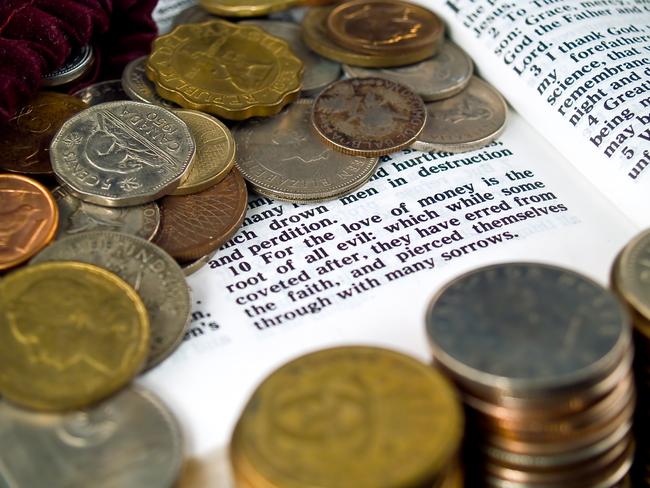Barefoot Investor: How Scott Pape quadrupled his money
THE Barefoot Investor learnt a wealth of advice following the world’s most famous investor, Warren Buffett. Then he quadrupled his money. This is how Scott Pape did it.
Barefoot Investor
Don't miss out on the headlines from Barefoot Investor. Followed categories will be added to My News.
LET me tell you a story about how I quadrupled my money. In September 2011, Warren Buffett’s company, Berkshire Hathaway, announced a plan to buy back its own shares.
I remember sitting there thinking to myself, “Well, if the best investor in the world thinks his shares are worth buying … who am I to argue?”
But it gets better, because at that time our dollar was trading at record highs — one Yankee dollar for one Aussie dollar.
So, I took a deep breath and bought as many Berkshire Hathaway shares as I could afford.
And, less than seven years later, I had quadrupled my money.

That very profitable experience taught me that when the wealthiest investor on the planet speaks, you stop what you’re doing and you listen.
Well, last week Buffett released his annual shareholder letter, and there’s one lesson in there that we all need to take note of ...
At the start of the letter each year, Buffett usually prints his very impressive track record:
Over the past 53 years Berkshire Hathaway shares have increased by a cumulative 2,404,748 per cent.
Yet this year Buffett did something a bit unexpected. He decided to highlight in a table the times Berkshire’s share price totally tanked:
In the ’70s, his shares fell by 59 per cent.
In the ’80s, his shares fell by 37 per cent. In the ’90s, his shares fell by 50 per cent.
And in the recent GFC (2008) his shares fell by 50 per cent.
“This table offers the strongest argument I can muster against ever using borrowed money to own stocks. There is simply no telling how far stocks can fall in a short period,” Buffett wrote. Hmmm.

Right now in the US, “margin loans” (loans taken out to buy stocks) are at all-time highs.
Much higher than at the peak of the GFC. And that’s before you factor in the widespread use of home equity lines of credit to buy stocks (people borrowing against the equity in their home loans), or risky funds that have in-built leverage (which multiplies your gains … or your losses).
Buffett, who is famously “greedy when others are fearful”, has built up the most amount of cash he has ever had sitting on the sidelines — ever. Join the dots.
The most successful investor in history is telling us that low interest rates and too much debt have pushed the prices of stocks too high. He’s been in business for 53 years and seen it all.
So what’s his prediction?
“In the next 53 years our shares (and others) will experience declines resembling those in the table. No one can tell you when these will happen. The light can at any time go from green to red without pausing at yellow.”
Tread Your Own Path!

NADINE ASKS: A young relative of mine, a single mum with a one-year-old, is in such a bad state that she posted her financial hardship story on a “crowd-funding” website.
The only donation she got was from her own mother — which (to me) says her mum is happy for her daughter to beg! She owes money for bills, a car and other things — and has even been to one of those debt companies you see on TV that “help” you pay your bills, but to no avail.
I genuinely want to do something, but I have learnt from trying to support her mum over the years that you can’t help those who won’t help themselves.
So I am writing to you to get some constructive advice. I can’t sit by and watch her become homeless!
BAREFOOT REPLIES: So you’re annoyed that her mum took your hard-earned money and started weeing it up against the wall!
Now you’re wondering if the apple doesn’t fall from the tree. And you know what? You’re probably right.
However, if you genuinely want to help this young woman, you’re going to have to really connect with her.
So, let’s you and I look at life from her perspective: She’s a single mother, deeply in debt, unable to pay her bills, and now resorting to begging for a buck.
Trust me, she doesn’t need your judgment — she’ll be judging herself more harshly than you ever will. The bottom line is that she’s scared she’ll never get out of her situation … just like her mum.

What she really needs more than anything (much, much more than a handout that enables her bad behaviour) is someone in her corner who truly believes in her. Someone who believes she has what it takes to eventually dig herself out of the hole she’s dug herself into.
Right now she probably believes it’s a hopeless situation. So take her out for coffee and show her page 189 of my book.
It’s a profile of a single mother who I nicknamed “Mojo Mamma”. This young mum was once all alone, with thousands of dollars in debts, and trying to escape a bad family. It took her years of hard work, studying at night, and scrimping and saving. But she made it.
And today that woman is one of the strongest people you’ll ever meet.
Even better, her young son is going to grow up knowing how much of a fighter his mother is.
Now of course your support and encouragement may not work … but how amazing would it be if it does?
WE SMELL A RAT!
FRANK ASKS: My wife and I desperately need your help. We have been following your wise advice for many years. We do not earn a lot (I am on $80,000 a year) but by implementing your plan we have accumulated $1 million in super, $250,000 in shares and $160,000 in savings.
I am 64 and want to retire, so I went to see a financial adviser. He recommended we take all our super and invest it in five Vanguard ETFs plus an SPDR Dow Jones Global Real Estate Fund. We smell a rat — do you?

BAREFOOT REPLIES: Before we get into sniffing rodents, first let me give you a pat on the back: on your income you’ve played an absolute blinder — well done, mate!
Now, I don’t know what you’ve got a whiff of, but I’m not sure if we can call it a rat just yet. See, the Vanguard ETFs (exchange traded funds) and the SPDR (or “Spider”) ETFs are ultra-low-cost index funds — the fees are around 0.20 per cent, or $200 for every $100,000 invested.
To quote financial rapper Jay-Z, “I got 99 problems but the fees on these ETFs ain’t one”.
That being said, things might get a little pongy if the adviser tries to wrap in substantial admin fees on top (not that I’m saying they will, but keep a close eye on it).
Know this: on your balance, paying an additional half a per cent will end up costing you an extra $100,000 in fees over the next decade. Ay caramba! That’s a lot of Coronas!
Look, if you’re going to invest your super in low-cost index funds — and that’s a smart strategy — I’d suggest you do it via an ultra-low- cost industry fund. You should be able to replicate the adviser’s stated portfolio for fees of less than 0.10 per cent, and under $100 a year in administration fees.
Sniff, sniff!

TITHING FOR THE CHURCH
JANICE ASKS: I am a single mum of three. I earn $86,000 a year, pay $624.10 per fortnight in child support (my hubby doesn’t work as he is a stay-at-home dad to our teenage kids), and owe $275,000 on the mortgage.
I am a teacher and tithe 10 per cent of my salary each fortnight to the church (non-negotiable commitment). But I just cannot fill my buckets — what would you suggest?
BAREFOOT REPLIES:
When you factor in your non-negotiables — child support, mortgage repayments and the tithe — you’re already coming close to spending 60 per cent of your take-home pay!
And that’s before you pay the other non-negotiables, like electricity, food, fuel, council rates and toilet paper.
If I were in your situation, I’d seek guidance from your pastor. If you’re a teacher, maybe you can pay your tithe by working for the church? Or perhaps you can do some tutoring?
Either way you need to increase your income (or decrease your outgoings) until your teenage kids are off your hands.
The Barefoot Investor holds an Australian Financial Services Licence (302081). This is general advice only. It should not replace individual, independent, personal financial advice.


